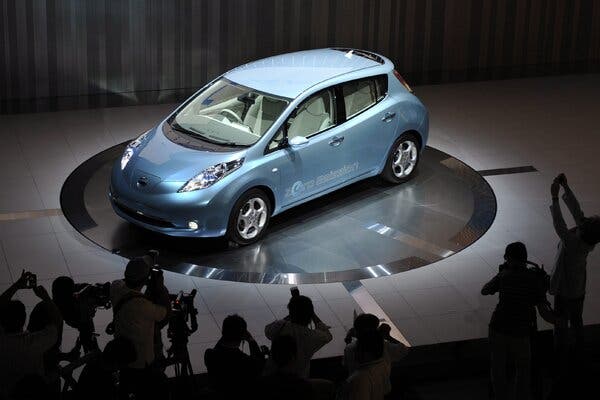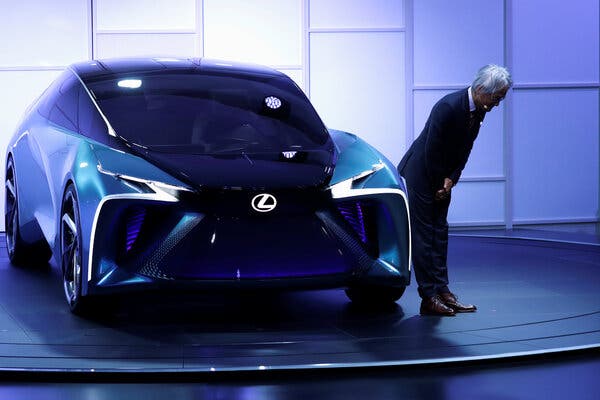Traditional car production has passed its golden age, why is Japan still hesitant to enter the electric vehicle market?
- Tram Ho
Just over a decade ago, Nissan became the first automaker to launch a battery-only car. This hatchback, called “Leaf,” became a big hit at the time, at least by electric vehicle standards. Late last year, more than 500,000 units were sold.
However, as the road Nissan walks on becomes increasingly crowded, Japan’s flourishing auto manufacturing industry risks being left behind. While governments and automakers around the world make bold commitments to switching to electric-only vehicles, Japanese businesses and regulators are still “defending. their bet.
The electric vehicle market is still young but full of potentials
Japan dominates the global market for the generation of environmentally friendly vehicles, gasoline-electric hybrids. They expect to capitalize on their huge investment in this technology for as long as possible. That short-term focus, however, puts the country’s vital industry at risk of missing an opportunity for change, according to Leaf’s early design lead Masato Inoue.
Mr. Inoue has retired since 2014. A former Nissan employee said: “When change comes, fear is there.” But whether they are ready or not, he added, “the big wave of electric cars is really coming.”
For now, electric cars are just a ripple. This vehicle currently accounts for less than 3% of global auto sales, with many buyers paying high prices, limited range and long charging times. Profiting from cars like these, with the exception of some luxury cars, is not easy.

Leaf electric car from Nissan.
But the race towards a fully electric-dominated future – which Tesla leads, has accelerated and expanded this year. In January, General Motors became the first major car manufacturer to announce it will produce engines powered by fossil fuels by 2023. Last week, Volvo also committed to making electric cars only by 2030.
In addition to traditional carmakers, startups like China’s Nio and even the “giant” Apple from other sectors are also “encroaching” into this potential market.
Automotive manufacturers in the US, China, Europe and South Korea have been in the process of “sprinting” to overtake Japanese rivals. In early 2020, Toyota launched the first electric car in the consumer market and then only launched in China. Meanwhile, Honda depends on GM to produce electric vehicles for the US market.
According to market analysis firm EV-volumes.com, last year, Japan only accounted for less than 5% of all electric cars sold worldwide. This figure is mainly contributed by Leaf’s popularity – cars that account for nearly 65% of all Japanese electric vehicles sold.
The trend of investing in electric vehicles has been fueled in part by plans in China, European countries and elsewhere aimed at phasing out gasoline-powered vehicles. The cessation of gas-powered vehicles is crucial to fighting climate change and reducing smog, the scientists said.
Such moves have created a potential market for electric vehicles. Accordingly, Tesla is worth six times more than the carmakers behind it combined, even though sales are only a fraction.
The danger Japan missed the opportunity
In Japan, however, the government and car manufacturers are posing a question about the fundamental driving force in this sector. They are still skeptical about the profitability and environmental superiority of electric vehicles.
In December, Japan said it would stop selling new gasoline cars by 2035. Even so, the government still considers hybrids an important technology and does not intend to take the same steps as the UK and California. This vehicle is banned.
The above point of view is most strongly expressed by Akio Toyoda – president of the Japan Automobile Manufacturers Association (JAMA) and president of Toyota. At a press conference in December, he expressed his opposition to Japan completely replacing hybrid cars with electric vehicles. In addition, he also said that the media of this country is “inflating” the profitability and environmental protection of electric vehicles.

Mr. Akio Toyoda and the Lexus LF-30 electric vehicle in 2019.
Whether Japan’s carmakers will change is not a problem, said Kota Yuzawa, auto industry analyst at Goldman Sachs. They have world-class technology and are dedicating resources to further developing it. Japan is waiting for the right time, he said.
The biggest question, Yuzawa says, is ” can you create a medium that is well-received by the public and can break even or not .”
According to Leaf designer Inoue, the answer is yes. However, the transition from building hybrid cars to electric cars is not easy. The two types of cars cannot be produced cost-effectively on the same platform, he said. And if businesses don’t change right now, production efficiency will be in trouble in the future.
With experience in mass production of electric vehicles, Nissan is arguably the best position among major Japanese automakers to compete in this market. However, the company has lost its lead and is also working to catch up.

Last summer, it announced its newest and ambitious electric vehicle after Leaf, an SUV called Ariya. In January, Nissan said it would neutralize carbon by 2050. Even so, like other Japanese carmakers, Nissan is also cautious.
Kazui Yajima is a former chief engineer at Leaf, and currently runs a small electric vehicle development company Blue Sky Technology. In Japan, he said, the government’s lack of enthusiasm for zero-emission cars could put automakers at a serious disadvantage.
According to him, China and the EU have lost the race for hybrid technology. So their government makes a strategic decision when it comes to investing in electric cars. The Japanese carmakers’ unwillingness to switch to electric vehicles could leave them in the same fate as the country’s consumer companies – which have lagged behind when not being ahead of the market.
Inoue shared that he agrees with the point of view and said cars are “the last battlefield” for the Japanese auto industry. “Japan is winning, but I think 10 years from now if it loses the chance to convert to electric cars, this country will lose,” he said.
Consult the New York Times
Source : Genk
